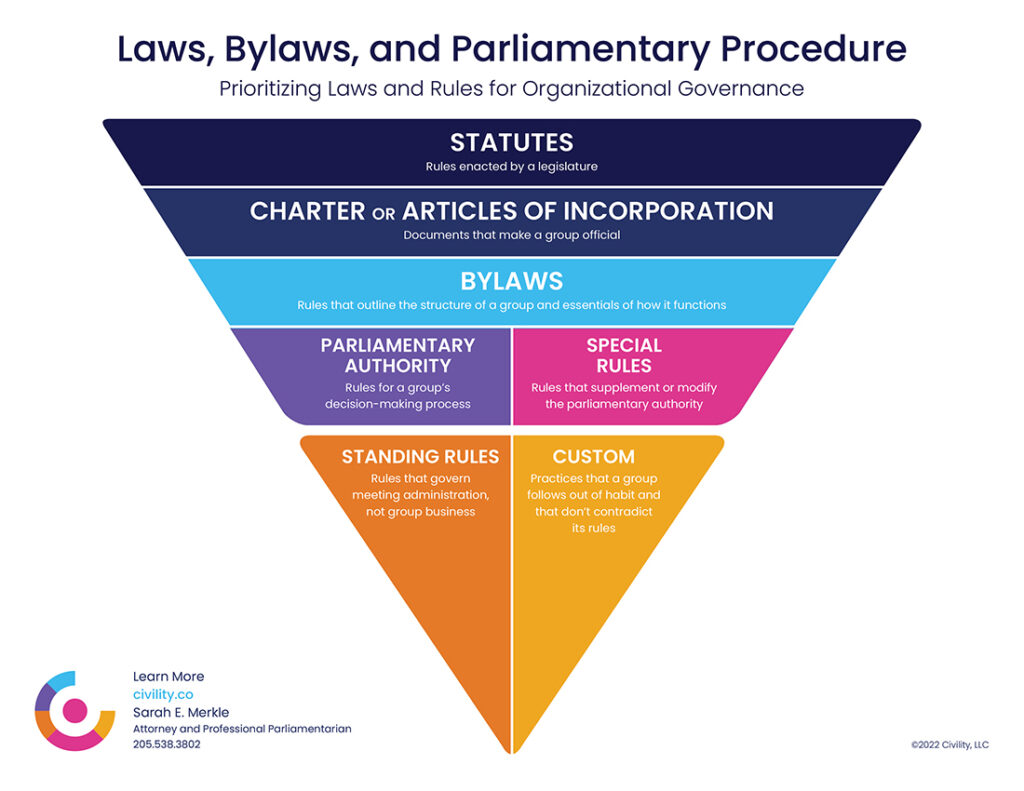

I talk a lot on this blog about Robert’s Rules. But let’s be clear that Robert’s Rules (or your parliamentary authority of choice) is not the end-all, be-all. Truth-be-told, there are many sets of rules that your organization must follow. Here’s a quick primer on them and how they work together.
Statutes – These are rules enacted by a legislature. It is not uncommon for state statutes to speak to issues of quorum and notice, for example. If there’s a conflict between your organization’s documents and the laws of your state, follow state law. Not optional. To find the laws that govern your group, look in your state statutes for the category fitting your description: non-profit corporations act, property owners corporation act, etc.
Charter – A charter (and/or the articles of incorporation) is the document that says, “Your group is officially a thing.” It validates an entity’s existence and makes the name and purpose of the group clear.
Bylaws – Bylaws are specific to your group. They define the primary characteristics of the organization, describe how it functions, and state the rights and duties of members. As a rule, they shouldn’t be overrun with procedural details.
Bylaws also include rules that are so important they cannot (and should not) be changed easily. Generally they should include at least these nine pieces of information: name, object, members, officers, meetings, executive board, committees, parliamentary authority, and amendment procedures.
Parliamentary Authority – A group needs to pick a rulebook. Robert’s Rules of Order is not the only one, but it is a common option used to help facilitate the smooth functioning of an assembly and provide a firm basis for resolving questions of procedure. If your bylaws don’t designate an authority, please do yourself a favor and adopt one.
Special Rules – These rules supplement or modify the group’s chosen parliamentary authority.
Custom – What about practices that are basically treated as rules because “we’ve always done it that way”? Totally fine, as long as the practice doesn’t conflict with other rules (bylaws, parliamentary authority, special rules). If a custom breaks a rule, the solution is “easy”: either stop the custom, or adopt a special rule that allows it.
Standing Rules – This last set of rules is related to the details of a group’s management – administrative stuff. For instance, members have to wear an official nametag to get into the convention hall for the business meeting. It’s not parliamentary procedure – just a group method for making sure only members get into the meeting to vote and discuss.
If you’re overwhelmed at this point, don’t be. I’ve listed these types of rules in priority order. First consideration – state law. Last in importance – your group’s customs and administrative procedures. Everything in between counts, too, but just apply each type of rule following the order listed above, and you’ll be fine.
Where to Learn More

Sarah E. Merkle, JD, CPP-T, PRP
Sarah E. Merkle is one of five attorneys in the world to have earned the credentials Certified Professional Parliamentarian-Teacher and Professional Registered Parliamentarian. She advises national, regional, and local organizations of all types and sizes on proper governance and parliamentary procedure, and how to make sound decisions in an efficient manner.